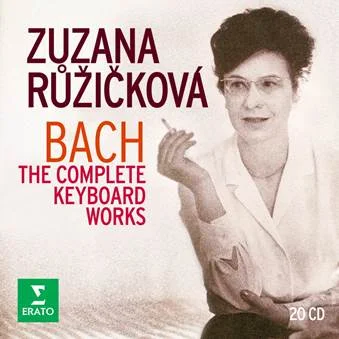ZUZANA RUZICKOVA: A HUMAN RIGHTS ICON FOR THE AGES
Tribute concerts were held in Prague on January 14, 2018n what would have been Zuzana's 91st birthday. In an obituary on October 28, 2017, The Times (London) ran the headline:
Zuzana Ruzickova - Harpsichordist known as ‘Mrs Bach’ who survived the Nazi camps and Communist persecution
The obituary headline in The New York Times - Zuzana Ruzickova, Leading Harpsichordist and War Survivor, Dies at 90
The new film, ZUZANA: MUSIC IS LIFE had its UK premiere on November 18, 2017. It was shown at the National Gallery of Art, Washington DC, on December 16, 2017 and upcoming screenings include Chicago and Santa Barbara in March, 2018.
Zuzana Ruzickova died in late September 2018 in Prague. The Czech national concert hall, the Rudolfinum, commemorated the event:
Zuzana Ruzickova had a remarkable life. She contributed enormously to so many, in her home country of the Czech Republic and far beyond. Her story and her music - and a very large number of articles about her and her husband, the brilliant composer Viktor Kalabis, can be found at Kalabismusic
In January 2017, Zuzana who celebrated at her 90th birthday with a magnificent concert in her honor in Prague and she had the opportunity of seeing - and enjoying - a brand new movie that is now hitting international film festivals: ZUZANA: MUSIC IS LIFE - please see the trailer and at www.zuzanathemovie.com
The 83-minute documentary is produced and directed by Peter Getzels and Harriet Gordon Getzels, executive producers Emily, Frank Vogl and William R. Rhodes. Join the ZUZANA: MUSIC IS LIFE FACEBOOK conversation.
In late 2016, Warner Records/ERATO released a remastered 20-CD box set of Zuzana's recordings of the entire keyboard works of Bach. The release attracted enormous European media coverage and praise. Zuzana made the original recordings in the 1960s and 1970s in Paris for ERATO and there is no other complete set of recordings of Bach's entire harpsichord compositions. (See the full press release from Warner records/ERATO)
The following essay is a personal perspective about Zuzana by Frank Vogl, whose father Walter Vogl was a first cousin of Zuzana's mother, Poldi Ruzickova. Poldi showed remarkable love and strength as she looked after Zuzana in the concentration camps, slave labor and after the war back in Czechoslovakia.
ZUZANA AND HUMAN RIGHTS
To rob a person of her or his dignity is the ultimate human rights abuse. Persecutors use rape, torture and humiliation as the tools to rip out the self-respect and dignity that their victims cling to. Once the authoritarians have deployed their violence and secured their goal, then their victims, now lacking in any semblance of dignity, are mere slaves: they have lost the will to live, let alone resist.
Zuzana Ruzickova was never broken. She maintained her dignity. Moreover, says Pavel Smutny, chairman of the Bohemian Heritage Fund in Prague, to listen to her recordings during the bitterest times of Communist Party rule in Czechoslovakia was to be reminded of “The true dignity of our nation.”
At 14, Zuzana and her cousin and best friend, Dagma Ruzickova, were forced by the Nazis to take “invitations” to the homes of Jews in the town of Pilsen in Czechoslovakia telling them to pack swiftly and get ready for deportation. Many people were in shock when they saw what Zuzana and Dagma had brought them; some killed themselves. Not long thereafter in 1941 Zuzana was deported together with her parents to Terezin concentration camp. Her father, still in his forties, died there because of the willful neglect of his illness by the Nazi guards. Zuzana remained unbroken.
The stench of death and the gas chambers was unavoidable every day that she lived in Auschwitz. In July 1944, she and her mother, Poldi, and thousands of others paraded before the drunken camp commander who determined who would live and who would be murdered. Zuzana and Poldi were sent to slave labor in Hamburg. They were given little food; they worked in baking sunshine carrying heavy bricks for hours upon end. At one time Zuzana fainted and when she was revived a prison guard declared, “Oh she is human after all.” Zuzana recounts that all the slaves were treated worse than animals and many died.
From there Zuzana and her mother went to the Bergen-Belsen death camp. It was liberated in April 1945 by the British army. All the inmates suffered from starvation and typhus. Zuzana was sick and her mother was in worse condition. And then she learned that Dagma was in the camp and she went to find her friend. Dagma died in Zuzana’s arms a few days later.
100 Miracles
Zuzana says she is alive because of “100 miracles.” She adds that the spirit of Bach saved her. She remembered so much of his music that she had studied before the war and those memories, she says, kept her going. Years later she would bring the inner power of Bach’s music on her soul to her performances and to her recordings of J. S. Bach’s entire keyboard compositions.
Three years after the end of World War Two, in 1948, the Communist Party organized a successful coup in Czechoslovakia and smashed democracy. “I thought this must be a joke. I could not believe that this was happening again,” says Zuzana.
Zuzana refused to join the Communist Party. Repeatedly over the decades to follow, the government sought to break her, to persecute her, to keep her under constant surveillance and at times to humiliate her. They failed. Zuzana was not allowed to perform with the Czech Philharmonic because its conductor was a Jew and government officials told her, “Two Jews in the orchestra would be one too many.” For years, Zuzana’s husband, the composer Viktor Kalabis, was denied any opportunity to find a decent job because he was told that he had committed two crimes: first, refusing to join the Party, and second being a “White Jew” – a non-Jew who married a Jew. Zuzana and Viktor never bowed. They fortified each other. Their music was their savior.
LISTENING TO BACH
When you listen to a Bach fugue, says Zuzana, then you are taken to the depths of despair and then you are lifted up. Zuzana was lifted up many times as she turned to the harpsichord and played for audiences across the world (the Czech government always took over 80% of her foreign currency earnings), and made many records and radio and television appearances. In the mid-1950s, just a decade after leaving Bergen-Belsen, she started to receive rising numbers of invitation to perform in Germany. She knew there would be Nazis in the audiences. How could she go? Viktor convinced her, saying: “You must be the Jew who brings Bach back to Germany.”
Zuzana notes that the brilliant German cultural tradition, with Bach such a central figure, was smashed by the NAZIs. The efficiency of their death machines ripped every thread of humanity out of the German nation. As he was dying, says Zuzana: “My father said don’t hate, it will eat you up –- leave revenge to God.”
Zuzana asserts that Bach provides a “sense of order in a world of disorder.” Now, in a world of grave disorder, where mass murder and the dignity of tens of millions of people is being assaulted every day from Syria to Iraq, Sudan, Pakistan, Congo, Honduras and many other countries, Bach and Zuzana are together at center stage once again.
Warner Music, using its ERATO label has released the remastered recordings of the entire J.S. Bach keyboard compositions that Zuzana first recorded in Paris in the 1960s and 1970. Nobody before or since has recorded all of Bach’s works for the harpsichord and now they are being launched in magnificent audio quality in a 20 CD box set.
Then, early 2017 will see the premiere of a major documentary about Zuzana, her life, her struggles, her dignity and her grace and, of course, her music. The 90-minute documentary is directed and produced by award-winning Peter Getzels and Harriet Gordon Getzels from the United States and is sponsored by the Viktor Kalabis and Zuzana Ruzickova Foundation (USA). .
The film is an uplifting story of human rights abuse resisted. As the film unfolds, moving from the depth of despair to great joy, so it reminds people everywhere of some of the worst horrors of the 20th century; but it inspires all who watch the film and learn of Zuzana’s life to believe that people have within them the strength to resist, free of hate and driven to enhance life through brilliant music.
Zuzana with Mahan Esfahani, her last student and plays a major role in the new film - ZUZANA: MUSIC IS LIFE




